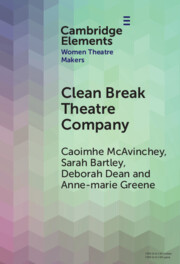Element contents
Clean Break Theatre Company
Published online by Cambridge University Press: 05 June 2024
Summary
- Type
- Element
- Information
- Series: Elements in Women Theatre MakersOnline ISBN: 9781009525909Publisher: Cambridge University PressPrint publication: 17 October 2024
References
- 4
- Cited by

